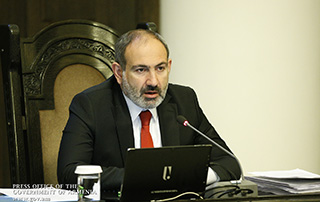Press releases
PM sums up outcome of his visit to Brussels: reference made to steps to take as part of EU-Armenia cooperation

Dear colleagues,
We are starting the next session of the government. Before proceeding to the agenda, I would like to say a couple of words about my visit to Brussels. As you know, our delegation was back from Brussels later yesterday after holding negotiations with the European Union leadership.
We are ushering in the stage of implementation of the Comprehensive and Enhanced Partnership Agreement with the European Union. Brussels stated that the European Union stands ready to assist us with the ongoing reforms and the development of our programs, in general. I should note that there is no geopolitical agenda in the cooperation between Armenia and the European Union, which is extremely important at this point.
We will have to make important decisions in the near future. Yesterday I referred to this in the National Assembly. The problem is as follows: today, we have discussed a number of mega-projects with the European Union, the first group of which has to do with road and transport infrastructures. Our goal is that highways in Armenia should be upgraded to European standards. We also have to make important decisions on the North-South project.
The next is the implementation of a major reservoir project and the introduction of a new water management system. In this context, it is crucial to set up a water treatment plant or system around Lake Sevan along the River Hrazdan at least as far as Lake Yerevanyan.
The next area is to implement school building, especially in terms of seismic protection. We are already implementing this program, but we need to expand its scope so that schools could first meet seismic requirements and then the academic standards.
We also need to implement serious programs in the system of justice. Talking to EU partners, I said that penitentiaries in our country are far from being deemed as compatible with New Armenia standards. We are facing problems in the judiciary. I was surprised to learn that court proceedings are sometimes held in the so-called corridors, which impairs the content of justice.
The European Union is prepared to support us in implementing all the aforementioned programs. However, our European partners are not going to provide 100% funding for these programs: they expect us to take a serious share and co-finance the proposed programs. In this regard, our primary task is to increase public revenue by means of administrative and economic leverages. Either here we will need foreign funds. To this end, we have stipulated in the government’s program that we consider infrastructures to be the primary target for attracting external funds. Here we need to make a political decision on how to deal with this issue since we have some legislative restrictions stemming from the GDP-national debt ratio.
Frankly speaking, I myself voted against all loan agreements without exception all the way through my parliamentary activity, and it had a very specific political justification. I said that we could not trust a government that we considered corrupt, especially as regards the spending of borrowed funds, and, unfortunately, our studies have justified my political position for at least some major programs.
Today we have to answer two questions: whether we can provide systemic guarantees that state funds and credit facilities are spent more purposefully, in general, and whether we can determine the scope and the limits where we can maintain the debt level manageable, without additional risks, that is, where borrowing could actually bring benefits rather than economic losses to Armenia.
We already have a preliminary agreement that within a month we will have joint discussions with the Central Bank on this topic. As a result, we will come to a conclusion and we will hold public discussions on our conclusion; we will have relevant debates in the National Assembly in order to find a common solution to the problem. By saying common, I mean the Government, the National Assembly, and, of course, the public ay large. I called your attention to this problem as an important item of thoughts and joint discussions over the coming months and maybe later.